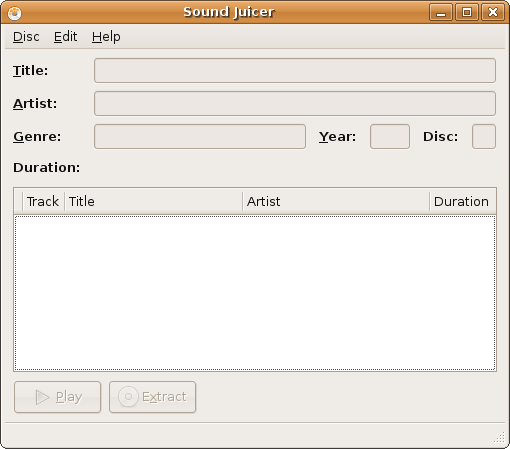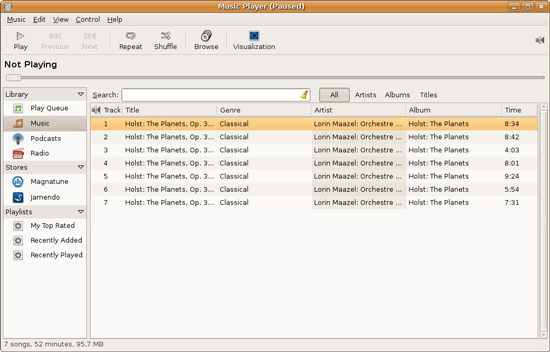Revisiting Linux Part 1: A Look at Ubuntu 8.04
by Ryan Smith on August 26, 2009 12:00 AM EST- Posted in
- Linux
Applications: Audio Organization/Playback
Windows Default: Windows Media Player
What I use: iTunes/Winamp
Ubuntu Default: Rhythmbox/Totem
There are 3 things people will never agree on in this world: Politics, the Yankees versus the Red Sox, and what multimedia player to use. It doesn’t take much effort to find someone who hates any given player and has their own idea of what the best player is, so looking at the players included with an OS is somewhat academic. No matter what OS it is, a number of users are going to replace the default with something else. So for our discussion on multimedia playback, I’m going to preface this with a thought: the Ubuntu defaults aren’t the only options, there are other programs out there if the defaults aren’t satisfactory.
With that said, when it comes to audio organization and playback Ubuntu comes with two programs: Rhythmbox and Totem. Rhytmbox is Ubuntu’s dedicated audio organization and playback suite – analogous to iTunes – while Totem is a combined audio/video player, similar to VLC or the classic versions of Windows Media Player. In spite of the fact that Rhythmbox is the dedicated audio suite, I mention both of these since Ubuntu will in fact use both. Attempting to open an audio file from the file browser will default to Totem, while Ubuntu’s application menu calls Totem “Movie Player”, leaving the “Music Player” distinction to Rhythmbox. As a result Ubuntu is a bit schizophrenic about its audio software – it’s inconsistent throughout the OS.
Since Totem is an audio/video player, we’ll save it for our Video section and focus on Rhythmbox. As I mentioned previously, Rhythmbox is analogous to iTunes; even the manual specifically mentioned that the program was “originally inspired by Apple’s iTunes.” In fact there’s not a lot to be said about Rhythmbox: it looks mostly like iTunes, it acts mostly like iTunes, and it does most of what iTunes does. Consider it iTunes-lite, and that’s Rhythmbox in a nutshell.
As iTunes-lite, Rhythmbox holds both the benefits and the downsides to such a design. Monumental among these are the fact that Rhythmbox isn’t nearly as bloated as iTunes can be. Rhythmbox gives you the basic iTunes experience while eating less than half the memory and loading in less than half the time it takes for iTunes to load. iTunes may have a lot of features, but you’re paying for them somewhere. For most people, the complete iTunes feature set is overkill and they would be better served by lighter program like Rhythmbox.
The price of that lightness however is the feature set that Rhythmbox doesn’t implement. Among other things it lacks its own ability to extra audio from CDs, instead relying on another Ubuntu program, Audio CD Extractor (Sound Juicer) to accomplish this. Similarly, it lacks the ability to quickly encode existing songs in to another format. Last, for purchasing music it doesn’t have access to a full-featured store – the included interfaces are for Magnatune and Jamendo, which are best described as indie stores. Purchasers looking for mainstream music would be limited to Amazon’s store, which has a proper web interface and may be a curse or a blessing depending on how much you like the iTunes Music Store being integrated in to iTunes.

Rhythmbox does have the ability to synchronize music with portable media players, however since Apple actively blocks their iPhoneOS based devices from syncing with anything besides iTunes, Rhythmbox can’t actually sync with the portable media players most people have. This meant that I was unable to sync my iPhone with Rhythmbox, and had to dual boot instead. We don’t have a legacy iPod on hand, but it sounds like the latest Classic/Nano models won’t work either. Users with legacy iPods would need to seek out something like GTKPod, which is designed specifically for iPod synchronization and should do the job.
Ultimately the usefulness of Rhythmbox depends on how well you know iTunes and how many of its deeper features you use. For basic music organization and playback it does just fine – you may as well be using iTunes. But power users will probably be unsatisfied. Meanwhile Windows Media Player users will find it a tossup; it still has fewer features than WMP, but WMP has always needed to take a hint or two from iTunes when it comes to layout.
Final Verdict: Satisfactory/Only Meets Some of My Needs











195 Comments
View All Comments
ioannis - Wednesday, August 26, 2009 - link
...sorry, I think it's Alt+F2 by default. I'm talking about the 'Run Command' dialog.Eeqmcsq - Wednesday, August 26, 2009 - link
Oh, yes you're right. I stand corrected.sprockkets - Wednesday, August 26, 2009 - link
Ubuntu doesn't ship with the firewall on eh? Weird. SuSE's is on, and that has been the default for quite some time. GUI management of it is easy too.clarkn0va - Wednesday, August 26, 2009 - link
For incoming connections I don't quite grasp what good a firewall will do on a system with no internet-facing services. With no open ports you stand little to gain from adding a firewall, and any internet-facing service you might add, well, you don't want to firewall that anyway.I can see two theoretically plausible arguments for a host-based firewall, but even these don't really stand up in real-world use: 1) a machine that has open ports out of the box (I'm looking at you, Windows), and 2) for the folks who want to police outgoing connections.
In the case of the former, why would we open ports and then block them with a firewall, right out of the box? This makes as much sense to me as MS marketing their own antivirus. Third-party firewalls were rightfully introduced to remedy the silly situation of computers listening on networks where they shouldn't be, but the idea of MS producing a host-based firewall instead of just cleaning up their services profile defies common sense.
In the case of outbound firewalling, I've yet to meet a home user that understood his/her outbound firewall and managed it half-way effectively. Good in theory, usually worse than useless in practice.
db
VaultDweller - Wednesday, August 26, 2009 - link
Just because a port/service is open, doesn't mean you want it open to the whole world.Examples:
SMB
NFS
VNC
RDP
SSH
Web (intranet sites, for example)
And the list could go on... and on and on and on, really.
Also, it's erroneous to assume that only 1st party software will want to open ports.
And that is to say nothing of the possibility of ports being unintentionally opened by rogue software, poorly documented software, naughty admins, or clumsy admins.
Host-based firewalls help with all of these situations.
clarkn0va - Wednesday, August 26, 2009 - link
Windows firewall doesn't filter by source. In other words, if you want SMB or any other service open to some peers and not others, Windows firewall can't help you; you'll need a more sophisticated product or a hardware firewall for that.I'm not saying there's no case for host-based firewalls, I'm just saying it's pointless for most users out of the box, where Ubuntu doesn't need it and Windows should be looking at fixing the problem of unneeded services running, rather than just bolting on another fix.
VaultDweller - Wednesday, August 26, 2009 - link
"I can see two theoretically plausible arguments for a host-based firewall, but even these don't really stand up in real-world use"That sounds to me like a claim that there is little or no case for a host-based firewall; at least, that's how I interpreted it.
"Windows firewall doesn't filter by source. In other words, if you want SMB or any other service open to some peers and not others, Windows firewall can't help you"
That is incorrect, and you should check your facts before making such statements. The Windows Firewall can filter by source. Any firewall exception that is created can be made to apply to all sources, to the local subnet only, or to a custom list of IPs and subnets.
The firewall in Vista and Windows 7 goes a step further, as it is location aware. Different ports and services are opened depending on the network you're plugged into, as exemplified by the default behavior of treating all new networks as "Public" (unknown and untrusted) until instructed otherwise.
clarkn0va - Wednesday, August 26, 2009 - link
"The Windows Firewall can filter by source. Any firewall exception that is created can be made to apply to all sources, to the local subnet only, or to a custom list of IPs and subnets. "In that case I retract my assertion that an out-of-the-box firewall makes no sense in the case of Windows.
As for Ubuntu, or any other desktop OS having no open ports by default, I still see including an enabled firewall by default as superfluous. Meanwhile, firewall GUIs exist for those wishing to add them.
Paazel - Wednesday, August 26, 2009 - link
...not enough pictures. admittedly my interest additionally waned when i read the newest ubuntu isn't be reviewed.philosofool - Wednesday, August 26, 2009 - link
I'm not done with this article, which I'm loving. However, there's a grammatical/spelling quibble that's driving me nuts: "nevertheless" is one world.